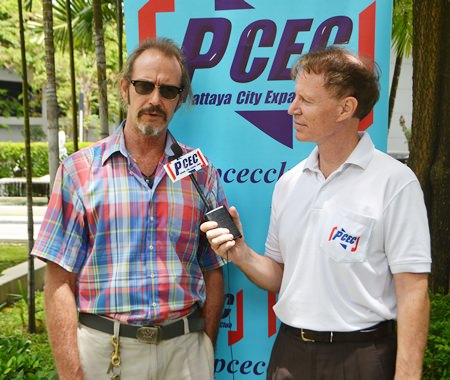People are curious; if you tell someone a certain topic is off-limits to them, it just makes them more determined to learn about it, and they will find a way around the restrictions. That’s why censorship doesn’t work at a psychological level, according to journalist Patrick Mattimore, the guest speaker at the February 28 meeting of the Pattaya City Expats Club. Patrick is a member of the Society of Professional Journalists. His areas of expertise are law, psychology, and education. He taught psychology for many years in the US.
While living in China from 2009 to 2012, Patrick frequently wrote for English newspapers there, and authored an award-winning on-line column for China Daily. He has also written commentaries for a variety of daily newspapers, professional magazines, and weeklies, including the Bay Area News Group in the United States and the Phuket Gazette in Thailand.
 Patrick Mattimore explains to his PCEC audience that in writing articles in a country with controls over the press, you need to understand your primary audience is your editor as it has to get by them to be published.
Patrick Mattimore explains to his PCEC audience that in writing articles in a country with controls over the press, you need to understand your primary audience is your editor as it has to get by them to be published.
As a journalist, Patrick said he has to abide by censorship rules. In China, he explained, people worry about what happens when a reporter is “taken out for tea.” In other words, “People just disappear, you don’t know what happened.”
“As long as you know what topics are off limits, it’s not hard to write,” he said. In China, off-limit topics include the Dalai Lama, Tibet, Falun Gong, Criticism of Government Officials, Taiwan as an Independent Country, and Censorship. However, he mentioned he found several ways to get by with skirting the “great wall” of censorship.
Sometimes he relied on the fact that “someone else is always accountable.” In the case of a journalist, that someone is the editor. So if Patrick can get it through his editor, it usually remains unchanged. He explained that there’s little editing in countries like China and Thailand; the editors don’t trust their English, so they don’t want to change anything. Sometimes he would get things through by employing a give-and-take tactic. He would first say something negative about the West, and then he could say but things aren’t perfect in China either. He noted that China Daily is read by more people outside China than inside the country.
 Coordinator Ira Wettenstein listens as PCEC Member Tony Heron provides comments about a recent experience of living in Thailand as an Expat during the Open Forum portion of the meeting.
Coordinator Ira Wettenstein listens as PCEC Member Tony Heron provides comments about a recent experience of living in Thailand as an Expat during the Open Forum portion of the meeting.
Patrick’s opinion is that it’s a lot tougher for Chinese journalists because the government doesn’t pay as much attention to what foreigners write as they do to Chinese nationals. People outside of Beijing, however, are very interested in foreigners. He was invited to tour China as part of a national tour of on-line writers. There were 99 writers, and he was the only foreign journalist. “We had an escort, and in every town they wanted to interview me.” But unfortunately his Chinese wasn’t good enough to really communicate effectively.
Another tactic he employed to get around censorship was to use outlets outside of China, such as the South China Morning Post in Hong Kong. He cited an incident when a US college basketball team that was touring China got into a fight with the Chinese team they were playing. The Chinese government shut down all news about the game, but Vice President Biden was visiting Beijing at the time, and had seen the game that was played the night before, so the brawl was front page news in the West. Patrick wrote about this, and why censorship doesn’t work, and sent the article to several mainland newspapers. He knew they would turn it down, so he sent it to the South China Post in Hong Kong, which at the time had more freedom. He noted that the newspaper now has been bought by Ali Baba, so he’s not sure how much freedom it still has.
Patrick, who was also an adjunct professor of law in the Temple University/Tsinghua University LLM program in Beijing, noted that young people in China all know how to get around the firewall that the Chinese government uses to block many websites, such as face book, twitter, and the New York Times. Once during a lesson, he told his students: “I can’t show you this because the website is blocked.” They all laughed. One student came up to the podium, hit a few keys on Patrick’s computer, and they were in the website. He said the student had simply used a VPN, or Virtual Private Network, which anyone can acquire from the internet.
Another time, he told his law students he was going to teach about censorship in an upcoming lesson. He noticed that some of his students were visibly uncomfortable. He emailed several articles about censorship to the students. The day before class, he received an email from the college dean saying, “You will not teach about censorship.” Copies of the Dean’s email also went to his students. “So the dean made my point,” said Patrick. “I didn’t even have to teach it.”
In Thailand, he felt the two main off-limit topics are the Monarchy and Prime Minister. Although some people say they write about these topics, he doesn’t write about things that could get him in trouble. Instead he writes about issues that he feels are important, such as motorcycle safety (visit http://www.phuketgazette.net/phuket-lifestyle/On-Mind-Change-Thailands-helmet-culture/52585 to read the article).
For more information on the PCEC’s many activities, visit their website at www.pcecclub.org.




